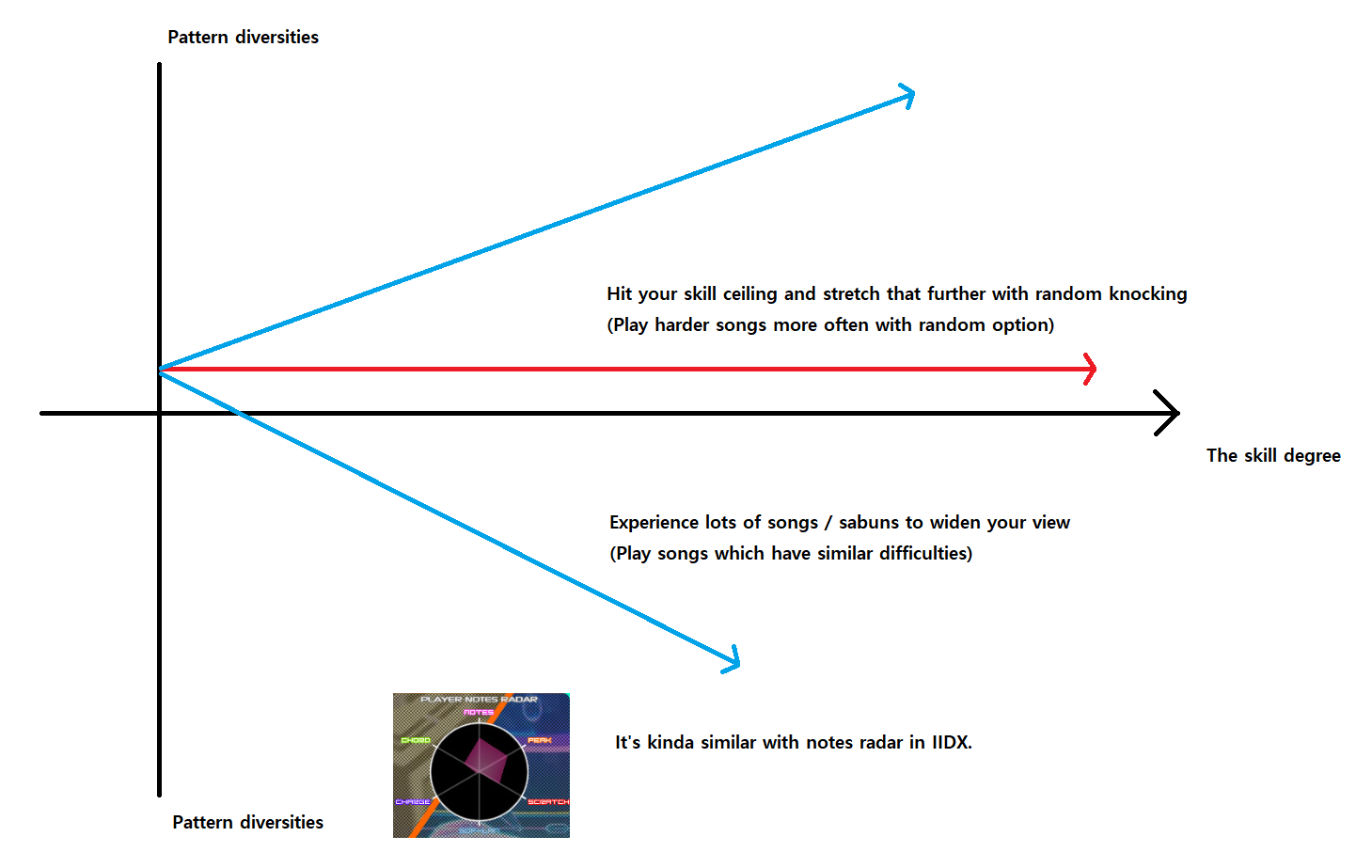Relaxation Technique (by Horie)
SP Expert
Table of contents
Notes
Understanding the concept of “relaxing” (Original article in Korean)
Contributor: P.ACID
References
Fix the misunderstandings regarding “Relaxing”; how to relax while playing (Korean) - fru1t
How to be good at DP (Korean) - fru1t
How to be good at IIDX (Korean) - SOMORI
Introduction
Whichever rhythm game you are playing, you typically feel relaxed playing songs at or below your skill level. In contrast, if you try harder, more challenging songs, you might find yourself not as relaxed. What are the differences between the two situations?
Perhaps you might just think, “I don’t have enough earth power”, or “I lack the ability to read and comprehend these complex charts”, but let me ask you this: do you feel tensed up while you play harder songs?
If you are over-conscious of your body, your muscles get tensed up and your fingers would not move the way you intend. Furthermore, I bet you have experienced this situation many times. Wouldn’t it be great if you could freely move your fingers to play difficult charts, just as you would for lower level charts?
The concept of relaxing
Relaxing means, “minimizing any unnecessary muscle tension while you play”.
This concept is from the fundamental piano practice method. In this article:
The human brain can be quite wasteful. For even the simplest tasks, the untrained brain uses most of the muscles in the body. And if the task is difficult, the brain tends to lock the entire body in a mass of tensed muscles. In order to relax, you must make a conscious effort to shut down all unnecessary muscles. This is not easy because it goes against the natural tendencies of the brain. You need to practice relaxation just as much as moving the fingers to play the keys. Relaxing does not mean to “let go of all muscles”; it means that the unnecessary ones are relaxed even when the necessary ones are working full tilt, which is a coordination skill that requires a lot of practice.
… this shows how pianists are encouraged to restrict and limit muscle usage to a minimum. Pianists play the keys over long sessions, which means they use their wrists and fingers for a long time too. They must be cautious about avodiing strains on their wrists and fingers to prevent serious injury.
In the same context, players who play button-based rhythm games like IIDX may share the same thoughts.
How to relax
Here are some tips which may be helpful:
-
Minimize your muscle usage, all the way from your finger tip to your shoulders. Importantly, it does not mean you should release all the tension from your muscles.
-
Be comfortable. Imagine that you are playing an easy song which you can handle. You should be doing this without having to consciously think about it.
-
Even if it’s just a short session, try to practice this mindset every session. Play often, and let your body learn this relaxed state.
-
Eat well, sleep well, rest well. Aim for the top condition.
There may be other personal techniques you pick up along the way.
You may not immediately understand from this article what it means to relax. First, try to play easier songs and try to remember what it feels like to play relaxed. Second, switch to harder songs, still remembering what it felt like playing easier songs.
Unfortunately, this is not an easy skill to obtain, and there are no precise ways to learn it. It’s up to how you feel; you need find your own method to learn it.
That being said, we can find some clues from fru1t’s past article (see references).
fru1t, DP overjoy BMS player, recommends two simple ways:
First, play harder songs with random option. Traditionally, this technique has been called random knocking. Using random option gives us two major benefits:
-
You can experience varied patterns from a single chart.
-
You can avoid learning bad habits which is caused by repetitive attempts (of the same chart).
In SP, it’s more obvious to use random option, but for DP is not as common. Therefore, for DP players, he recommends DBR instead. (Note, DBR is usually not recommend until DP 10th dan)
Second, play lots of songs in the same difficulty range. It’s a good way to incrementally train your brain.
Getting your brain to overcome fear
Have you ever played games like Dark Souls or Elden Ring? If so, you may have seen videos where skilled players can easily defeat the bosses, even though they seem to be constantly in danger of dying.
Can they do this because they have higher level of physical abilities and better stamina?
Well - no. This might be a surprise, but you probably already possess the motor skills to beat harder songs that you currently struggle with. The problem is your brain - it may not know how to efficiently move your fingers, or it might get overwhelmed by information (notes) presented to you at once.
To overcome this, expose your brain to these “difficult” situations more often.
Train your brain to think, “this level of song is nothing to me”. Eventually, one day, your brain will overcome the fear.
Conclusion
This article would be useless to you if you could already gachi-hit all the notes in Verflucht SPL. It’s cruel, but that’s the truth.
You may think, just play harder songs, get better stamina, strength and everything will be fine.
Yes. It’s true - but if you do that with little efficiency, you may eventually experience physical strain - such as wrist tendon injury. In fact, many high level players had experienced these kinds of injuries. In the worst case, you may have to quit playing altogether.
While it’s important to gain the physical strength and stamina needed to play long sessions, it’s equally important to efficiently make use of your given strength.

